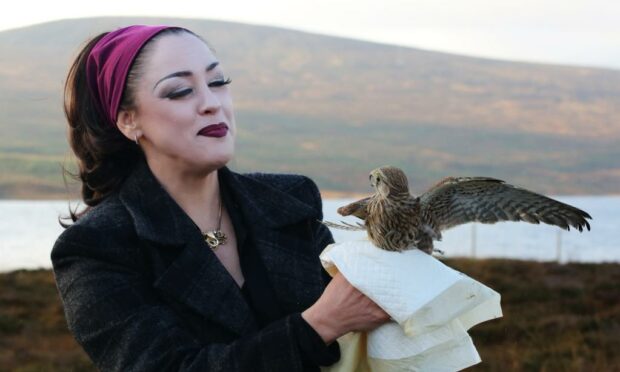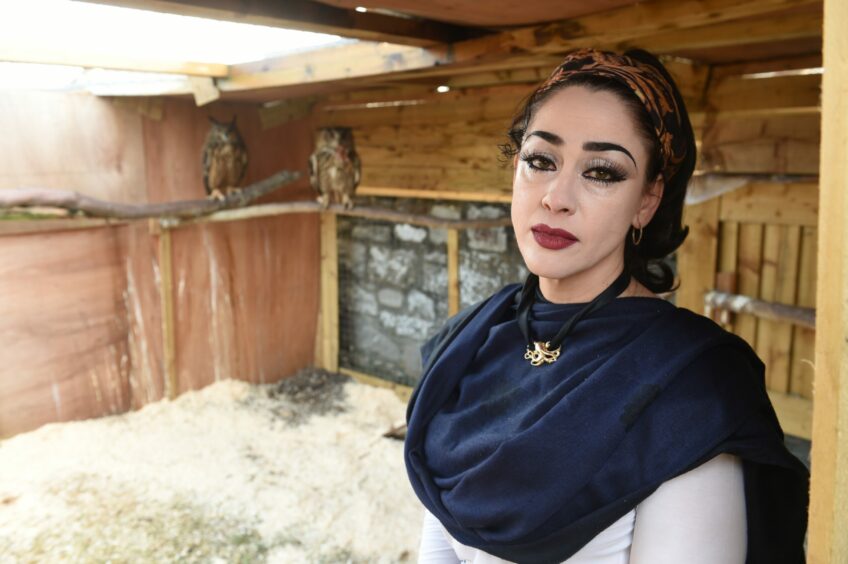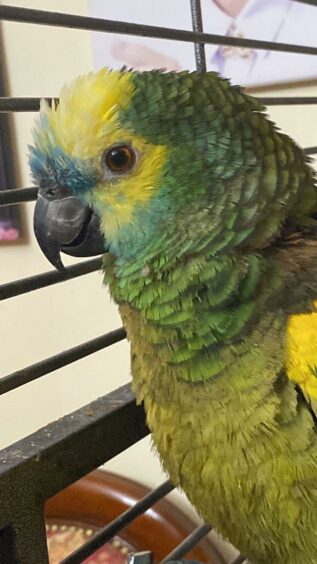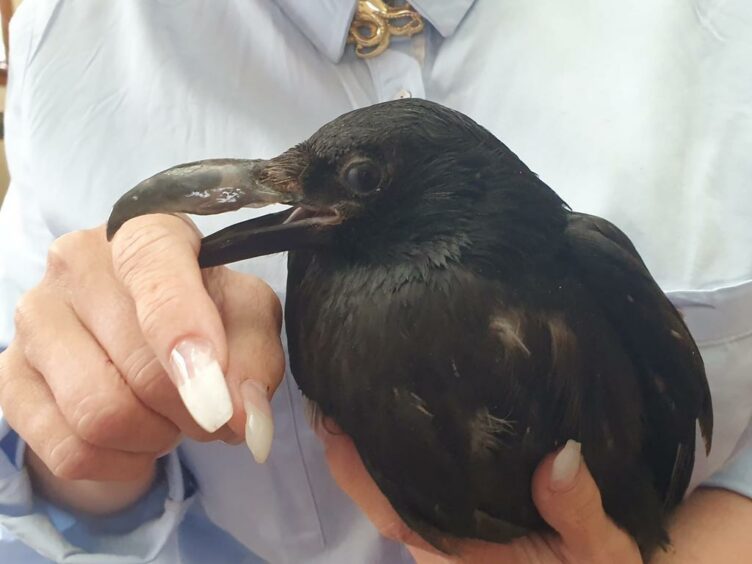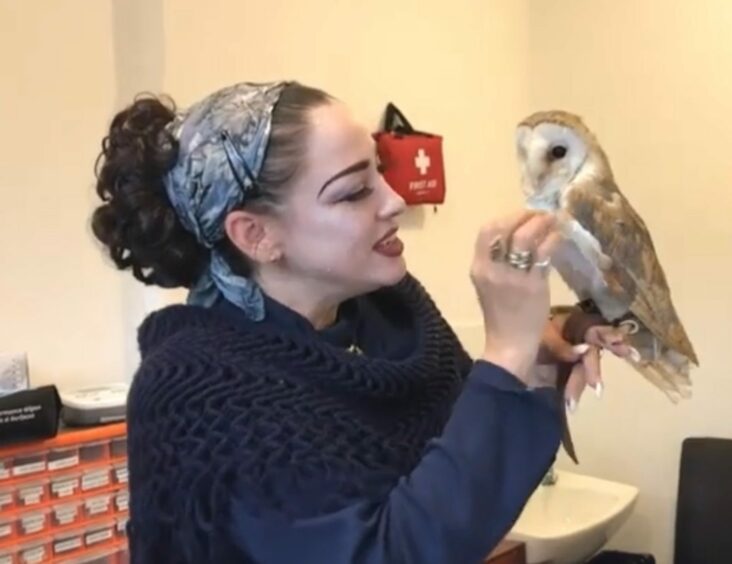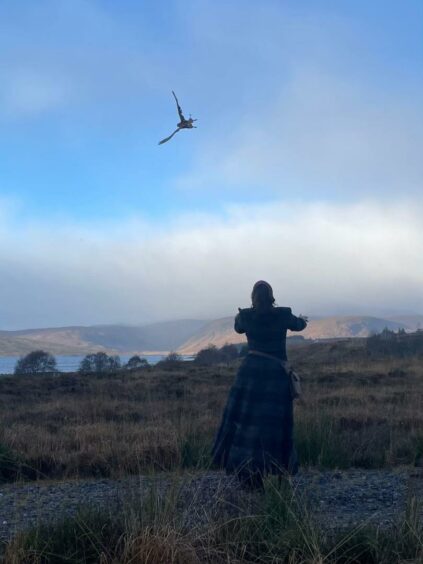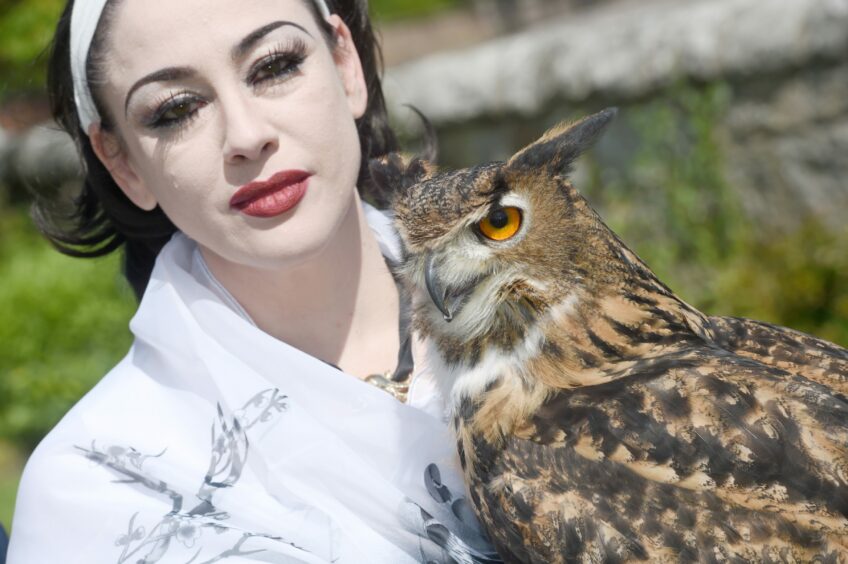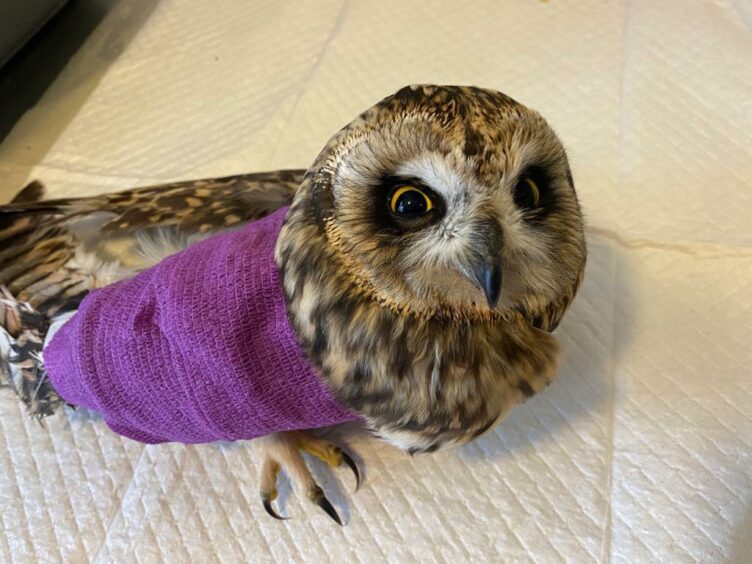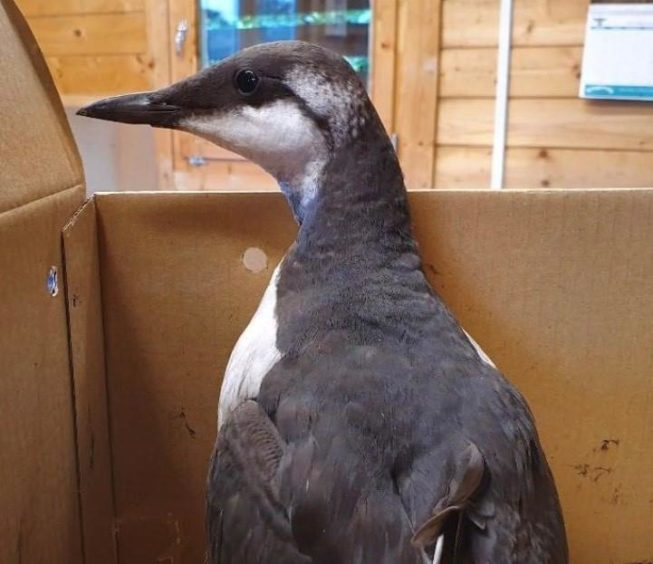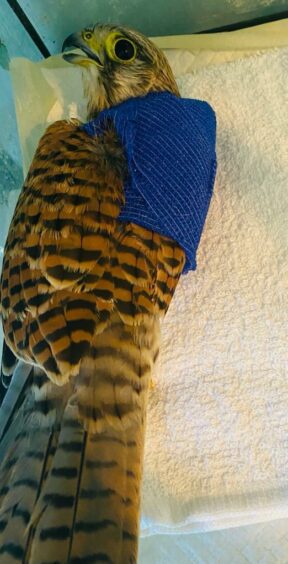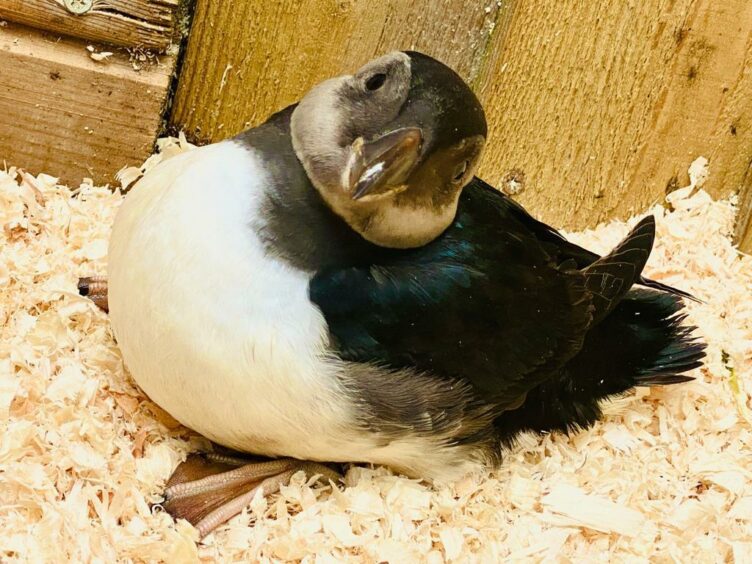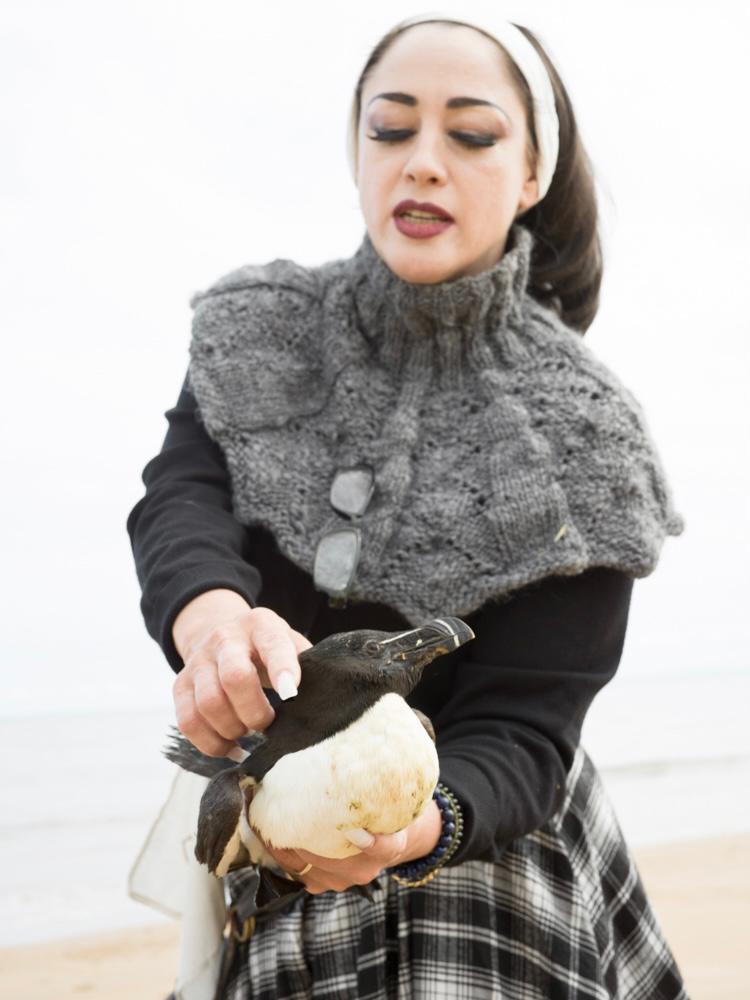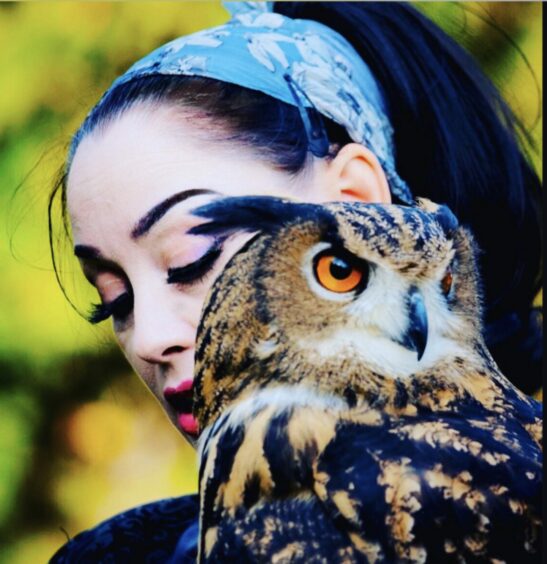Hamish the parrot once again screeched for attention, bringing our interview to a quite literal screeching halt.
Lady Hadassah Broscova-Righetti tutted and turned once more to the blue-fronted amazon beside her in Brora.
“Don’t worry sweetie, we’re not ignoring you,” the countess said. Her kindly voice seemed to satiate the little green bird, and he let out a satisfied squeak before settling down.
Hamish is just one of the thousands of avian guests who Hadassah has taken under her wing as founding director of the Blue Highlands Raptor Rescue and Avian Conservation Centre in Brora over the years.
But the centre isn’t just a place of work for Hadassah, it is her home where she’s ready to respond to any bird-related emergencies 24 hours a day.
It’s also home to up to 2,000 injured or poorly birds every year.
From gunshot wounds to vehicle collisions, abused pets to persecuted predators, the centre takes in all kinds of birds from across the north of Scotland.
Hadassah explained the centre has a number of roles, from a “triage centre” to get birds stabilised before they get seen to by vets, to a “forever home” for neglected or disabled feathered friends.
And for each and every creature great and small that comes into her care, Hadassah chooses to intentionally anthropomorphise them with a name.
What is in a name?
Although she acknowledges this is an unusual practice for someone running a wildlife rescue centre, she believes it’s a key contributing factor to the around 75% recovery and rehabilitation rate at Blue Highlands.
From Hope the oystercatcher to Glory the crow with a broken beak, Hadassah does her very best to get to know all the birds in her care at the centre.
Hadassah said: “I don’t know if it’s the best philosophy, it’s not the philosophy of any other rescue centre that I know of, to be honest.
“We believe that the more attached you are the better a treatment a bird gets, and the better the overall outcome.
“What is the bad side of this?
“Well, you can imagine that when a bird perishes it is heart-breaking.
“But if you’re more concerned, you’re going to get up four times in the night to check on a bird that’s in critical condition.
“If you’re less attached and the bird is just a number, then you may only get up once a night.”
She added: “It’s harder to divorce yourself emotionally when you know that Amber had a successful wild release yesterday, or the devastating effect of Frederick perishing.”
Why does Hadassah have the title of Countess?
Although she places much importance on the names of her birds, Lady Hadassah does not share the same feelings about her own title.
The half-Scottish, half-Russian woman has lived all across the world, from Italy to America, in a life spent dedicated to protecting birdlife.
She explained that although she holds the inherited Croatian in origin title of Countess of Vrelo, she does not want this to detract from her work, and so hardly ever uses her full, formal name.
“I rarely use the title, for a few reasons,” Hadassah said of the honorific, which she said was originally bestowed by Emperor Franz Josef I of Austria.
“But the number one reason is that it’s extremely important to me that people don’t get distracted by that which will eventually turn to dust, and get distracted from what I believe is of the greatest importance, the work that we’re doing for the birds.”
And Hadassah has done a great deal of work indeed.
‘We’re stretched very thin’
For more than 30 years, the 49-year-old has worked in bird conservation in centres across the world, including Texas, Oregon, Italy, Mexico and Albania.
She and her husband moved to Scotland around five years ago, when she established Blue Highlands’ home at Brora.
With only herself and one other permanent staff member at Blue Highlands, assistant director Jane Wilson, Hadassah has her work cut out for her.
She said: “Our behaviour and lives are dominated by the welfare of the birds, every single day without exception and without holidays — this is our life’s work.”
The charity receives all kinds of birdlife in all sorts of conditions, from poorly parakeets and other exotic pets, to owls, birds of prey and seabirds native to Scotland and its waters.
The animals come into the care of Blue Highlands from all kinds of people and organisations, including concerned members of the public, the Scottish SPCA, the police, vets, zoos, and sometimes as a result of court cases.
Earlier this year, Hadassah and Blue Highlands were overwhelmed with the thousands of guillemots and other seabirds which were washing up all along the east coast of Scotland.
Of the hundreds in her care starving and sickly, around 90% of them died.
And although every death is painful for Hadassah, she says she doesn’t want to think about what would happen if her service was not available.
Covering all of Caithness and Sutherland, the centre welcomes up to 2,000 birds annually, including some from outside the highlands.
“We’re stretched very thin as when you look at the map, it’s almost the entirety of the north of Scotland we cover,” she said.
“We’re open 24 hours a day, it’s not entirely unusual for the bell to ring at 2am and it’s the police from an entirely different region with a bird that’s been a gunshot victim and needs care.
“The necessity of our position here… I don’t even want to think about it.
“I can’t tell you how many times I’ve heard from professionals ‘thank god you’re here’.”
Struggles with Covid and hope for the future
Like other wildlife rescue centres in Scotland, Blue Highlands has endured great challenges brought about by Covid.
Because of a shielding family member, and concerns that the virus could potentially harm the birds in her care, Hadassah has not allowed any volunteers at the centre in Brora since the start of the pandemic.
And of course, with the impact of the virus on fundraisers and purse strings, cash became a major concern for keeping the doors open at the charity.
Thankfully, an online fundraiser generated more than £12,000 for Blue Highlands last year, but Hadassah explained there are still challenges ahead.
She said: “We’re £1,000 a month just for food, and then there’s medicine, the building, and maintenance to worry about.
“It creates a deep sense of concern and anxiety because not only is your centre vitally important in terms of helping red and amber listed species of birds, but also it’s in danger of closing because of a loss of care from the public.
“Thank goodness we hit our fundraising goal, it was just enough to allow us to keep our doors open for another year.”
Hadassah said that she’s been pleased to see the shift in public perception of those who care for nature, but highlighted the benefits her centre gets from the support of the old guard.
She added: “On one hand I have tremendous hope for the future generations because they seem to care so much more about nature and our planet.
“When I was younger, these were subjects that were relegated to hippy communities.
“Now, I have more faith in humanity because I think we are now more aware of just how brutal the war on our natural environment has become, and how those effects are inarguable.
“However, most of our supporters are my age, so whilst the younger generation seems to care more, in terms of actual aid and boots on the ground support for people like us that are on the knife’s edge of these issues, it’s not there.”
